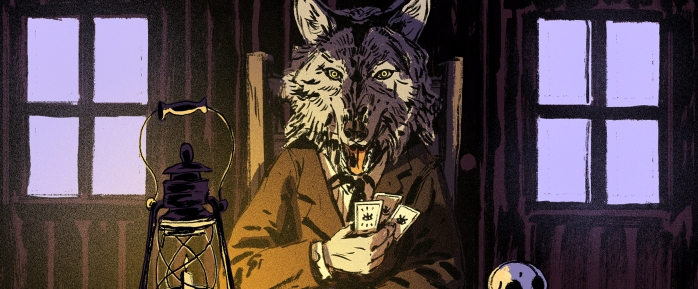
Where the Water Tastes Like Wine Betrays the Heart of Storytelling
A mix of oral tradition, performance, and improvisation, storytelling is a ripe medium for exploration and examination. Its intimate nature makes a tale told well that much more dynamic and personal. That’s why Where the Water Tastes Like Wine was such an exciting prospect. By centering the act of storytelling as a central mechanic, you can look at how stories are not only relayed to people, but how they grow and evolve depending on the storyteller. But not only do Where the Water Tastes Like Wine’s mechanics not work towards that end, but the game’s constant awareness that it is a video game end up dragging down the writing as well. Most egregiously, though, the game doesn’t understand the soul of storytelling.
Now that’s not for the lack of an interesting setting and conceit. Set during the Great Depression, Where the Water Tastes Like Wine tasks you with traveling across the United States in search of stories, which you then have to relay back to other drifters you meet along the way. The idea here is that you telling these stories will cause them to catch on, eventually taking on a life of their own as they evolve as more people tell the story.
The stories you encounter across the country aren’t too bad, either. Couched between very real depression-era struggles a la The Grapes of Wrath and the outright magical realist Americana of Kentucky Route Zero, Where the Water Tastes Like Wine’s uncanny encounters feel more like vignettes than full-fledged stories, ending before they really have a chance to begin. That’s not a bad thing, though, as it gives them an ethereal quality and provides the perfect base for building a story on top of.
Unfortunately, when it’s time to actually tell the story, you don’t actually tell it so much as you relay what happened behind a blank screen saying that you told the story. The only interactive part of Where the Water Tastes Like Wine’s storytelling is in choosing which story to tell. Once you’ve chosen a story, you’re given a one-line screen that regurgitates that, yes, you’re telling the story you chose. That’s it. And while there’s some play in finding stories that meet the whims of your audience – sometimes they want funny stories, scary stories, etc. – Where the Water Tastes Like Wine completely cedes the actual act of the supposed star of the game.
It’s not like there’s not a lot to work with in storytelling. Just the act of it is a complex thing that requires more than just telling something that happened. Storytelling is a performance, often to a small audience, and requires you to expertly emphasize each part of the story in an appropriate manner. It takes a great deal of improvisation, of reading the room and responding appropriately. An expert storyteller can take a scary story and retell it as a hopeful one. And it’s not like Where the Water Tastes Like Wine has the excuse that these things are too difficult to be made into a game. All of the movements that a great storyteller makes can be reproduced in game mechanics. By completely omitting the telling, the game betrays the very reason for the game’s being.
But maybe it’s more concerned with how stories spread than how stories are told. Dire Wolf, the humanoid creature with a wolf’s head who gives you your quest initially, even says as much. And stories do indeed spread. After just one telling, that particular story is eligible to come back to you in a different form during your travels. But it does so in the most reductive, video gamey way possible. When a story comes back to you, it’s essentially a leveled-up version of your original story, at least as far as your audiences are concerned. While you’re telling your stories to the many drifters out there, a meter in the upper part of the screen indicates how much accumulated interest your stories are generating, provided they match the type of story that the person in question currently wants. The leveled-up stories will generate more interest and unlock more of that person’s personal story.
This doesn’t work because the nuance seemingly stops there. You’ll tell a story, and then it will randomly pop up again along the way. There are three different levels to the stories, and they always level up to the same stories without any concern for where they’re told. If there’s an algorithm behind the spread, it’s invisible, which is a shame, because it could have given Where the Water Tastes Like Wine something insightful to say about how stories spread, but as it stands in the game, it’s just an extremely video gamey mechanic bereft of meaning.
Some storytelling is found when you hear about the drifters’ lives in exchange for your stories, but once again, the fact that it’s a video game warps how the story is told. Portions of these people’s stories are locked away in future “Chapters” that only reveal themselves when you’ve maxed out their interest meter. But the stories that they tell don’t warrant multiple chapters, so what you get is a bunch of rambling quips that hint at their lives without outright saying anything concrete. The drifters themselves are also compromised by the video gameyness. Each one has one special thing about them, and you know this because it’s the only thing they talk about. There are no other layers to be found, making them feel like one-note caricatures. Again, this is because in a video game, you have to have an objective, and the objective here is to suss out what the character’s “thing” is by laying stories at their feet. At all time, Where the Water Tastes Like Wine is anxiously aware that it is a video game, and the writing suffers within those very nervous constraints.
What we end up with in Where the Water Tastes Like Wine is a shame, because it’s very core betrays what it purports to be about. By omitting the act of storytelling in favor of selecting from a menu, the game completely misses the magic of the art form. By being so self-conscious about its video game status, Where the Water Tastes Like Wine chokes its own promising but unfulfilled writing. And in a game about stories, that’s the biggest crime of all.





